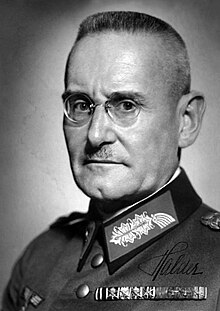
Back Franz Halder Afrikaans فرانز هالدر Arabic فرانز هالدر ARZ Frans Qalder Azerbaijani Франц Гальдэр Byelorussian Франц Халдер Bulgarian فرانز ھاڵدەر CKB Franz Halder Czech Franz Halder Danish Franz Halder German
Franz Halder | |
|---|---|
 Halder in 1938 | |
| Chief of the General Staff of the German Army High Command | |
| In office 1 September 1938 – 24 September 1942 | |
| Leader | Adolf Hitler Walther von Brauchitsch as Chief of the German Army High Command (until 19 December 1941) |
| Preceded by | Ludwig Beck |
| Succeeded by | Kurt Zeitzler |
| Personal details | |
| Born | 30 June 1884 Würzburg, Bavaria, Germany |
| Died | 2 April 1972 (aged 87) Aschau im Chiemgau, Bavaria, West Germany |
| Spouse | |
| Signature |  |
| Military service | |
| Allegiance | |
| Branch/service | German Army |
| Years of service | 1902–1942 |
| Rank | |
| Battles/wars | World War I
|
| Awards | Knight's Cross of the Iron Cross |
Franz Halder (30 June 1884 – 2 April 1972) was a German general and the chief of staff of the Army High Command (OKH) in Nazi Germany from 1938 until September 1942. During World War II, he directed the planning and implementation of Operation Barbarossa, the 1941 invasion of the Soviet Union. Halder became instrumental in the radicalisation of warfare on the Eastern Front. He had his staff draft both the Commissar Order (issued on 6 June 1941) and the Barbarossa Decree (signed on 13 May 1941) that allowed German soldiers to execute Soviet citizens for any reason without fear of later prosecution, leading to numerous war crimes and atrocities during the campaign. After the war, he had a decisive role in the development of the myth of the clean Wehrmacht.
Halder began his military service in 1914. In 1937 he met and became a supporter of Adolf Hitler. Halder participated in the strategic planning for the 1939 German invasion of Poland. The plans authorised the SS to carry out security tasks – on behalf of the army – that included the imprisonment or execution of Poles. In July 1940 he began planning for the Axis invasion of the Soviet Union, Operation Barbarossa, which began on 22 June 1941. That summer Halder engaged in a long-running and divisive dispute with Hitler over strategy. Hitler removed Halder from command in September 1942. After the 20 July 1944 plot to assassinate Hitler, Halder was arrested as it came to light that he had been involved in an earlier plot, leading to his imprisonment. As chief of OKH General Staff, he had kept extensive notes, later published as The Halder Diaries.
After World War II Halder served as a lead consultant for the US Army Historical Division. He oversaw the writing of over 2,500 historical documents by 700 former German officers, whom he instructed to remove material detrimental to the image of the German armed forces. Halder used his influence to foster a false history of the German-Soviet conflict in which the German army fought a "noble war" and which denied its war crimes. The US Army overlooked Halder's apologia because Halder's group was providing military insights on the Soviet Union that it deemed important in the light of the Cold War. Halder succeeded in his aim of exonerating the German Army: first with the US military, then amongst widening circles of politicians and eventually in American popular culture. In 1961, he was awarded the Meritorious Civilian Service Award.
- ^ Barnett 2003, p. 126.
© MMXXIII Rich X Search. We shall prevail. All rights reserved. Rich X Search